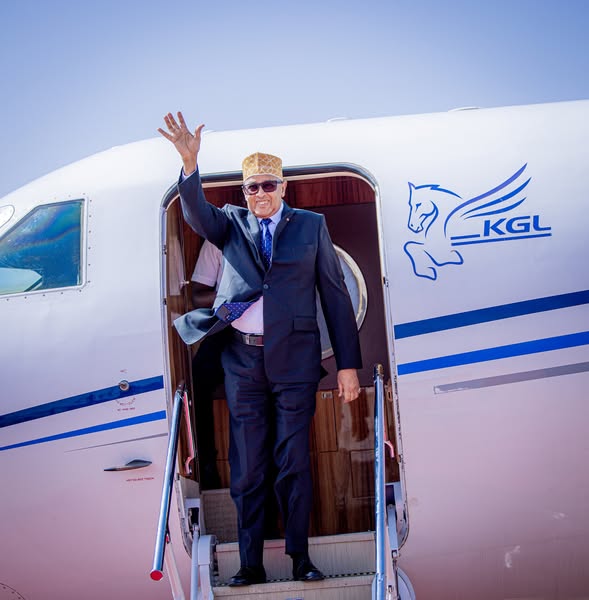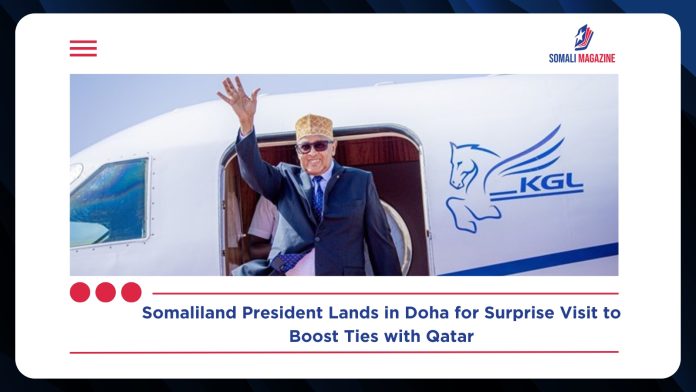Facebook Twitter (X) Instagram Somali Magazine - People's Magazine
Somaliland President makes unannounced visit to Qatar, marking a historic first for the self-declared republic as it seeks to expand its diplomatic and economic footprint in the Gulf region. President Abdirahman Mohamed Abdillahi Irro touched down in Doha on Saturday aboard a special aircraft, accompanied by a high-level delegation that includes ministers of foreign affairs, interior, religious affairs, and economic advisors.
The visit, which had not been publicly disclosed in advance, is being interpreted as a bold diplomatic maneuver aimed at resetting Somaliland’s relationship with Qatar—a country that has traditionally aligned itself with the Federal Government of Somalia and has not recognized Somaliland’s claim to independence.
While no official statement has been released by the Somaliland presidency, sources familiar with the matter suggest the trip is focused on strengthening bilateral ties, attracting investment, and exploring cooperation in areas such as infrastructure, maritime security, and regional stability. The delegation is expected to hold several high-level meetings with senior Qatari officials during their stay.
This surprise visit signals a significant shift in Somaliland’s foreign policy posture. In 2017, during the Gulf diplomatic crisis, Somaliland sided with the United Arab Emirates and Saudi Arabia, backing sanctions against Qatar over allegations of terrorism financing—claims that Doha has consistently denied. The current outreach to Qatar suggests a recalibration of Somaliland’s alliances in the Gulf, driven by economic pragmatism and a desire to diversify international partnerships.
Analysts say the visit could open new doors for Somaliland, which has long struggled for international recognition despite maintaining its own government, currency, and security forces since declaring independence from Somalia in 1991. Qatar’s vast investment portfolio and influence in the Horn of Africa make it a valuable partner for a region seeking development and legitimacy on the global stage.

The timing of the visit is also notable. It comes amid heightened geopolitical competition in the Red Sea and Gulf of Aden, where regional powers are vying for influence over strategic ports and maritime routes. Somaliland’s Berbera Port, already under development through a UAE-backed deal, has become a focal point in this contest. Engaging Qatar could offer Somaliland additional leverage and investment options as it seeks to position itself as a key player in regional trade and logistics.
President Irro’s delegation includes key figures such as Foreign Minister Abdirahman Dahir Adan, Interior Minister Abdale Mohamed Arab, Minister of Religious Affairs Sheikh Abdullahi Dahir Jama, and Senior Economic Advisor Dr. Abdirahman Duale Beyle. Their presence underscores the multifaceted nature of the discussions, which are expected to cover not only political and economic cooperation but also social development and humanitarian aid.
While the visit has sparked cautious optimism in Hargeisa, it also raises questions about how Qatar will balance its longstanding ties with Mogadishu and this new engagement with Somaliland. The Federal Government of Somalia has previously objected to any foreign government dealing directly with Somaliland, viewing such actions as undermining Somalia’s territorial integrity.
Nonetheless, the visit is being hailed by Somaliland officials as a step toward greater international engagement. “This is about building bridges, not burning them,” said one senior official traveling with the president. “We are here to explore mutual interests and show that Somaliland is open for business and diplomacy.”
As meetings unfold in Doha, observers will be watching closely to see whether this diplomatic overture leads to tangible outcomes. For Somaliland, the stakes are high—but so is the potential reward.

